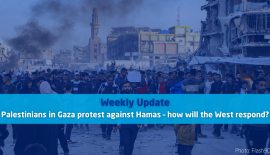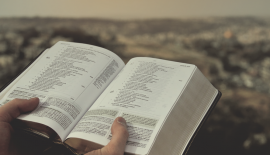Eyewitness 7 October Recounts
Shani Teshuva is an eyewitness to the 7 Oct. attacks on villages around Gaza. When she was in the Netherlands for a short visit, Christians for Israel’s Chairman Leon Meijer asked her a few questions.
Shani, can you tell us something about your hometown and how it was living there?
“I live in Kibbutz Zikkim, which is a small kibbutz just a few hundred meters from the northern border of the Gaza Strip. The same distance to the west is the Mediterranean Sea. A small army base is located right next to our kibbutz. There is also a small dairy farm and some greenhouses where we grow vegetables. In the kibbutz’s factory, mattresses are produced. It is a lovely place to live. We never lock our doors. Everyone knows each other, and the children can play wonderfully together. Of course, in recent years, there have been rocket attacks time and again. But as crazy as it may sound, we got used to them. When the children went outside, they didn’t promise us that we would be home on time like in a normal family. Our kids had to promise to run to an air raid shelter if the air alarm went off.”
What happened on the morning of 7 Oct.?
“Every Saturday, I take my bike and cycle about 25 kilometres early in the morning. I ride to the beach first and then pass a few other kibbutzim and then return back home. Because of the heat in Israel, I ride early in the morning when it is still cool. I was up early that day, but contrary to my expectations, it was not as hot as the days before. That’s why I decided to wait a little longer to go out of the gate. If I hadn’t, I wouldn’t be alive now. At 6.29am, all hell broke loose. Thousands of rockets flew over us. Normally, the Iron Dome (Israel’s air defence system) takes the rockets down, but because there were so many of them, the Iron Dome ran out of missiles. Missiles started falling on our kibbutz, and my husband was asked to help evacuate people. To make matters worse, the network went down, and we could not reach each other by phone. Around 8.30am, we heard other sounds, mortars being fired at us just a hundred metres away. The navy called us— fortunately, the phone was working again—and reported that hundreds of infiltrators were coming into the country via the sea, and they could not stop them all. Our security team was fortunately alerted and managed to stop infiltrators. Our kibbutz was saved from much worse by the warnings. Meanwhile, terrible reports were seeping in via WhatsApp about our neighbouring villages, where hundreds of people had been killed and kidnapped.”
Several months have passed since 7 Oct. Are you, and the people of the kibbutz, able to resume life?
“It is very difficult. After 7 Oct., I stayed with relatives. Most people from my kibbutz were evacuated to hotels. While it still is not safe at the kibbutz, as Hamas is still firing rockets, I returned back to my home. About 40 per cent of the people have returned to the kibbutz. Almost 30 per cent of the residents do not want to come back. It is too traumatic; 19 people were killed on the beach, and eight soldiers were killed at the small army base next to the kibbutz. Everything reminds us of what happened on 7 Oct. And yet we pick up our lives again, not knowing what that will be like.”
During your stay in the Netherlands, you spoke at a meeting of Christians for Israel. What would you like to share with us?
“First and foremost, thank you. Thank you for your support and love. We realise that we are not alone. We need friends and here in the Netherlands I saw a venue filled with friends. Make sure you are well informed, by using good information you can expose the lies and help people understand what is happening.”






